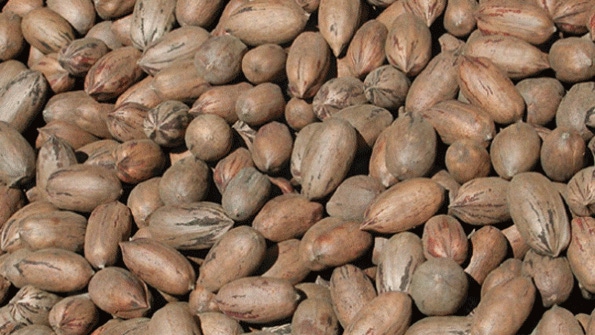
Deep into the pecan crop year, Extension specialists in both New Mexico and Texas are predicting a good yield in 2012 with most orchards across the Southwest reporting heavy nut loads on trees that are in relatively good health.
Of the major pecan production states, Georgia has long held the overall production title with Texas second. But last year’s drought and a growing number of pecan acres in Southern New Mexico helped to elevate the Land of Enchantment into the number 2 slot.
In 2011, New Mexico growers produced about 61 million pounds of the pecans, down about 5 million pounds from 2009 because of drier conditions, but up considerably over 2008 numbers. Last year’s drought-stressed Texas pecan crop dropped considerably to around 40 million pounds, down from near 60 million pounds the year before.
“In New Mexico we’re looking at an estimated 58 million pounds of pecans this year, largely because we have more orchard acres than last year and because a freeze in February eliminated the threat of pecan casebearers this year,” reports Dona Ana County Extension agent Jeff Anderson.
Anderson reports currently the nuts appear healthy and abundant and says actual production numbers may beat expectations.
The Texas pecan crop finds itself in the same boat with healthy nuts and heavy-laden trees.
“I have heard crop estimates as low as 48 million and as high as 60 million pounds in Texas this year,” reports Texas AgriLife pecan Extension specialist Bill Ree. “I see a good crop on tap as it stands right now.”
Ree says he has received a number of calls, especially from homeowners who have pecan trees in their yard and want to know why the branches on the tree are hanging so low.
“They often don’t realize it is all those nuts that are weighing down the limbs. There are a lot of trees out there with a lot of pecans on them,” he adds.
Ree and Anderson warn it is too early to tell if conditions will remain optimal for a bumper production, but both say they remain hopeful.
“Our crop [in Texas] is ahead of schedule for this time of year in terms of development and maturity. The final quality of the crop is an unknown until harvest, but I still see a good crop,” Ree says.
Ree and Anderson both say the pecan industry is encouraged as prices remain good and both expect 2012’s production will meet demand.
The U.S. produces about 80 percent of the global crop, with Georgia, once again, producing the largest crop last year with 110 million pounds. Early indications are that the Georgia crop will also be larger this year than last year.
Oklahoma’s total production is expected to exceed last year’s 9 million pounds. Louisiana also harvested about 9 million pounds of pecans in 2011 and tied with Oklahoma as the sixth largest pecan producing states. Other significant crop states included Arizona at 18.5 million pounds (ranked No. 4 in pecan production last year); Alabama at No. 5 with 10 million pounds; California was 8th at 3.9 million; South Carolina’s 3 million pounds ranked 9th; and Arkansas at 2.6 million pounds rounded out the top ten states.
Total U.S. production last year was 271 million pounds.
“We are seeing a few pecan weevils and stink bug problems but at this stage in the growing year we are past casebearer concerns,” Ree said.
Anderson says the worst problem ahead could be weather, especially wind damage to heavily-laden trees.
“We lost some nuts to hail earlier this year, but all in all we have faired rather well,” he said.
About the Author(s)
You May Also Like




